Abstract
How do noise and manipulation affect the accuracy of collective decision rules? This paper presents simulation results that measure the accuracy of ten well known collective decision rules under noise and manipulation. When noise is low these rules can be divided into accurate ("good") and inaccurate ("bad") groups. The bad rules’ accuracy improves, sometimes significantly, when noise increases while the good rules’ performance steadily worsens with noise. Also, when noise increases the accuracy of the good rules deteriorates at different rates. Manipulation delays the effects of noise: accuracy improvement and deterioration due to noise emerge only at higher noise levels with manipulation than without it. In some cases at high noise levels there is only a negligible difference between the accuracy of good and bad collective decision rules.
Preview
Unable to display preview. Download preview PDF.
Similar content being viewed by others
References
Bartholdi, J.J., Tovey, C.A., Trick, M.A.: Voting schemes for which it can be difficult to tell who won the election. Social Choice and Welfare 6, 157–165 (1989)
Basset, G.W., Persky, J.: Robust Voting. Public Choice 99, 299–310 (1999)
Conitzer, V., Sandholm, T.: Universal Voting Protocol Tweaks to Make Manipulation Hard. In: Proceedings of the 18th International Joint Conference on Artificial Intelligence, pp. 781–788. Morgan Kaufmann, San Francisco (2003)
Conitzer, V., Sandholm, T., Lang, J.: When Are Elections with Few Candidates Hard to Manipulate. Journal of the ACM 54, Article 14 (2007)
Faliszewski, P., Hemaspaandra, E., Hemaspaandra, L.A., Rothe, J.: Llull and Copeland Voting Computationally Resist Bribery and Control. Univ. of Rochester Comp. Sci. Dept. Technical Report TR-2008-933 (2008)
Kalai, G.: Noise Sensitivity and Chaos in Social Choice Theory. Discussion Paper Series dp399. Center for Rationality and Interactive Decision Theory, Hebrew University, Jerusalem (2005)
Levin, J., Nalebuff, B.: An Introduction to Vote-Counting Schemes. Journal of Economic Perspectives. Winter 9, 3–26 (1995)
Mitlöhner, J., Eckert, D., Klamler, C.: Simulating the Effects of Misperception on the Manipulability of Voting Rules. In: Endriss, U., Lang, J. (eds.) Proceedings of the 1st International Workshop on Computational Social Choice (COMSOC 2006), pp. 345–355. Institute for Logic, Language and Computation, Universiteit van Amsterdam (2006)
Mueller, D.C.: Public Choice II. Cambridge University Press, Cambridge (1989)
Procaccia, A.D., Rosenschein, J.S., Kaminka, G.A.: On the Robustness of Preference Aggregation in Noisy Environments. In: Proceedings of the 6th International Joint Conference on Autonomous Agents and Multiagent Systems, pp. 416–422. IFAAMAS (2007)
Saari, D.G.: Susceptibility to Manipulation. Public Choice 64, 21–41 (1990)
Smith, D.A.: Manipulability Measures of Common Social Choice Functions. Social Choice and Welfare 16, 639–661 (1999)
Truchon, M., Gordon, S.: Statistical Comparison of Aggregation Rules for Votes. Mathematical Social Sciences (2008), doi:10.1016/j.mathsocsci.2008.11.001
Author information
Authors and Affiliations
Editor information
Editors and Affiliations
Rights and permissions
Copyright information
© 2009 Springer-Verlag Berlin Heidelberg
About this paper
Cite this paper
Bodo, P. (2009). The Effects of Noise and Manipulation on the Accuracy of Collective Decision Rules. In: Rossi, F., Tsoukias, A. (eds) Algorithmic Decision Theory. ADT 2009. Lecture Notes in Computer Science(), vol 5783. Springer, Berlin, Heidelberg. https://doi.org/10.1007/978-3-642-04428-1_6
Download citation
DOI: https://doi.org/10.1007/978-3-642-04428-1_6
Publisher Name: Springer, Berlin, Heidelberg
Print ISBN: 978-3-642-04427-4
Online ISBN: 978-3-642-04428-1
eBook Packages: Computer ScienceComputer Science (R0)




